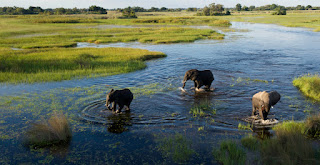The Okavango Delta Problem (Part 1)
The Okavango Delta is one of the world's most famous wetlands, officially having been declared a Ramsar site in 1996. Despite its esteemed status, communities residing around the delta have seen their livelihoods deteriorate as a result of the delta's growth.
In this blog series, I will be exploring the reasons for this paradox and what can be done to ensure that communities around the delta benefit from its international acclamation.
When the Okavango Delta Management Plan (ODMP) was launched in 2008, it was heralded as the most consultative Okavango Delta-related endeavour to ever be carried out. The main mandates of the plan were to establish viable management infrastructure and tools for sustainable management of the delta resources, ensure that the delta continues to deliver present-day ecosystem goods and services and lastly, facilitate the sustainable use of the delta's resources for the equitable improvement of the livelihoods of all stakeholders who are directly and indirectly dependent on the delta ecosystem.
As reasonable and sensible as these mandates appeared on paper, the reality is that the ODMP has worked well to serve the interests of the foreign and private concession holding companies operating in the delta, whose shareholders include some of the country's political heavyweights, at the expense of communities that have for ages relied on the delta for sustenance. Through the ODMP, whose implementation has been spearheaded by the government of Botswana, much emphasis has been placed on increasing the use of the delta for conservation and tourism through the expansion of Moremi Game Reserve and the formation of Wildlife Management Areas around the reserve.
This expansion has meant that communities who depended on the delta for livestock rearing, hunting and gathering, fishing, rain-fed agriculture, etc are being pushed further and further away from the delta to make room for tourism. The only role that locals play in the booming tourism sector which has cost them their livelihoods is menial jobs in high-end lodges within the delta concessions where reports of terrible working conditions have braced local media over the years.
The fault for this pushing off of local communities from the delta is on the government of Botswana which continues to prostitute this natural resource to the international community at the expense of local ownership and access to resources. During the consultation process for the drafting of the ODMP, when asked for comment on the lack of citizen participation in the industry, Grant Woodrow, who is the Chief Operations Officer of Wilderness Safaris, one of the major safari companies operating within the delta, pointed out that the industry was still in "infancy " and should be allowed to achieve growth led by foreign-based "experts" before it can be dominated by locals which he said will happen "in the near future".
These words were uttered in 2008. Today, 13 years later, nothing has changed with regards to citizen participation in the delta's tourism and conservation industry. So much for "in the near future". It would however be unfair for private companies to be burdened with all the blame for this lack of citizen participation. After all, they are just playing the cards they have been handsomely dealt with. The government of Botswana is the main culprit for this state of the tourism industry.
The industry has a high capitalization requirement and a lack of product diversity which means without significant government protectionist policies, it would be impossible for budding local tourism entrepreneurs to even set foot in the industry and survive competition from the decades-old incumbents. But alas, none of that facilitating assistance has been anywhere to be found.



This comment has been removed by a blog administrator.
ReplyDelete